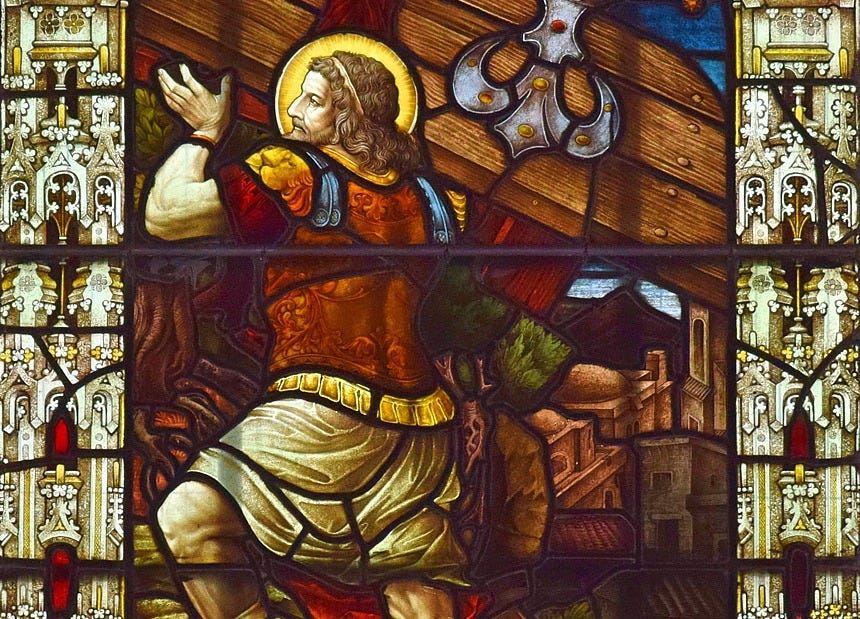The Power of Sacramentals
The practice of using “sacramentals” is often looked at with suspicion by those who are not a part of an apostolic church. Whether it’s holy water, a relic, an icon, a miraculous medal, a scapular or a crucifix, using sacramentals and expecting to get some kind of spiritual benefit from them is frequently dismissed as superstition. However, I believe that there are some interesting biblical precedents for this idea.
The first and most obvious example of something like sacramentals in Sacred Scripture is relics. According to 2 Kings 13:20-22, the bones of Prophet Elisha had the power to raise someone from the dead. In the New Testament, we learn that the hem of our Lord’s garment was an instrument through which the woman with a problem of blood was healed (Matt 9:20-22); the mere shadow of St. Peter had the power to heal the sick (Acts 5:14-16); and the clothing worn by St. Paul was sought after to heal both physical and spiritual diseases (Acts 19:11-12). These examples are well known and oft repeated, and for good reason. They illustrate that seeking after physical objects touched by divine power in order to obtain some kind of spiritual benefit from them is not intrinsically superstitious. Instead, given their presence in Scripture, things like relics seem to be blessed by God.
However, perhaps some may agree with this yet still believe that the Catholic tradition goes too far. After all, wasn’t St. Pachomius promised that anyone who wore his monastic habit would attain eternal salvation? Aren’t there Catholic sacramentals like the brown scapular that say things like, “Whosoever dies wearing this scapular shall not suffer eternal fire”? Isn’t this too far? Well, it should first be considered what exactly this language is trying to convey.
Clearly, given the Catholic Church’s teaching on justification, it isn’t saying that you need to obtain some kind of physical object in order to be saved. Salvation is a free gift that Christ dispenses to us directly in the sacraments of baptism and confession, Deo gratias. Rather, the belief that wearing a sacramental will enable one to be saved is affirming that, through the instrument of that physical object, God will “prepare us to receive grace and dispose us to cooperate with it” unto our final salvation (CCC 1670). In other words, a sacramental acts as a special “motive” for God to dispense graces that will give us the strength to refrain from mortal sin and thereby persevere in the state of grace until our deaths.
This way of speaking is comparable to St. Paul’s teaching in 1 Corinthians 7:16, “how do you know, wife, whether you will save your husband? Or how do you know, husband, whether you will save your wife?” Do husbands and wives actually have the ability to grant eternal salvation to one another? In the direct sense, obviously not. However, what the Apostle is saying here is that spouses can be instruments through which God brings someone to and preserves them in salvation. The same could be said of anytime you simply pray for someone’s salvation or that they be kept away from temptation. Such prayers actually do something!
Furthermore, consider the teaching of our Lord that, “Whosoever gives one of these little ones even a cup of cold water because he is a disciple, truly, I say to you, he will by no means lose his reward” (Matt 10:42). Taken at face value, Jesus seems to be saying that anyone who shows an act of kindness towards His disciples, on account them being His disciples, will certainly be saved. But this isn’t necessarily true. It’s possible for someone to show supernatural charity towards Christians at one point in their life, only to turn around later and renounce that charity unto their damnation. Indeed, that a disciple can forfeit their salvation is the entire point of our Lord’s fearful parables in Matthew 25 concerning the Final Judgment.
However, this doesn’t make Jesus into a liar for promising that a man who shows kindness towards His disciples “will by no means lose his reward.” Obviously, such a promise is contingent upon the individual faithfully “endur[ing] until the end” (Matt 24:13), something that acts of charity can truly aid. So it is with promises such as, “Whosoever dies wearing this scapular shall not suffer eternal fire.”
That being said, some might still object that while we may be able to speak about prayer or acts of charity assisting the faithful unto salvation, we cannot believe that God uses physical objects as instruments through which he bestows spiritual strength on Christians. But why not? Without argument this is just an assertion, and since God is all-powerful, if He wants to use something like a miraculous medal to bestow graces on people, who are we to judge? Even aside from this, though, I do believe that we have a biblical precedent for God imbuing a physical object with the power to give His people spiritual (and physical) strength: Samson’s hair.
Although there are some commentators who wish to say that Samson’s hair didn’t have any “real power,” their arguments aren’t very strong. In order to avoid charging the biblical authors with superstition, it’s sometimes suggested that it wasn’t the cutting off of Samson’s hair that made him lose his strength but rather his breaking of the Nazarite vow, since it required him not to cut his hair (Num 6:5; Judg 13:4). However, this explanation doesn’t capture the full truth. Samson had violated his Nazarite vow prior to Delilah cutting off his hair, as when he fornicated with a prostitute (Judg 16:1), something that clearly went against his promise to “be holy” and “set apart for the Lord.” So there must be something more to the story.
Indeed, the biblical text really does portray Samson’s hair as somehow being the actual source of his strength. Delilah seeks to know “where his strength lies” (Judg 16:6), and after being deceived for the first time Scripture says that she still didn’t know “the secret of his strength” (Judg 16:9). It’s only after Samson tells Delilah, “If my head is shaved, then my strength will leave me” (Judg 16:17), that she’s able to take a razor to his head and, sure enough, “his strength left him” (Judg 16:19). Samson’s long hair, the symbol of his unique consecration to the Lord as a Nazarite, was a physical object that God imbued with the power to give His servant strength. This is why Samson’s final act of heroic strength, which involved killing the enemies of God through destroying their house with his bare hands (Judg 16:28-30 cf. Heb 11:32-38), occurred only after his hair had grown back (Judg 16:22).
This, I would posit, is almost exactly how we believe the sacramentals work. Like Samson’s hair, sacramentals are physical signs of our inward consecration to the Lord. As such, He can use these signs to bestow grace that will enable us to actually carry out our devotion. As symbols of our consecration to the Lord Jesus Christ, their power is obviously derived from His grace and not the objects themselves. However, it’s nonetheless through these physical objects that God has chosen to bestow that grace. Just as the Lord might choose to bestow the grace of freedom from sin through the prayers of a certain individual (cf. Js 5:16-18), so too might He choose to do so through interaction with some object, whether that be an icon, a medal, a scapular, a relic, or whatever else has been blessed by God and the Church.






